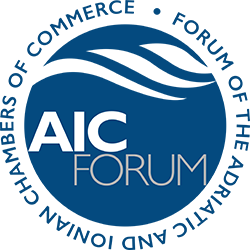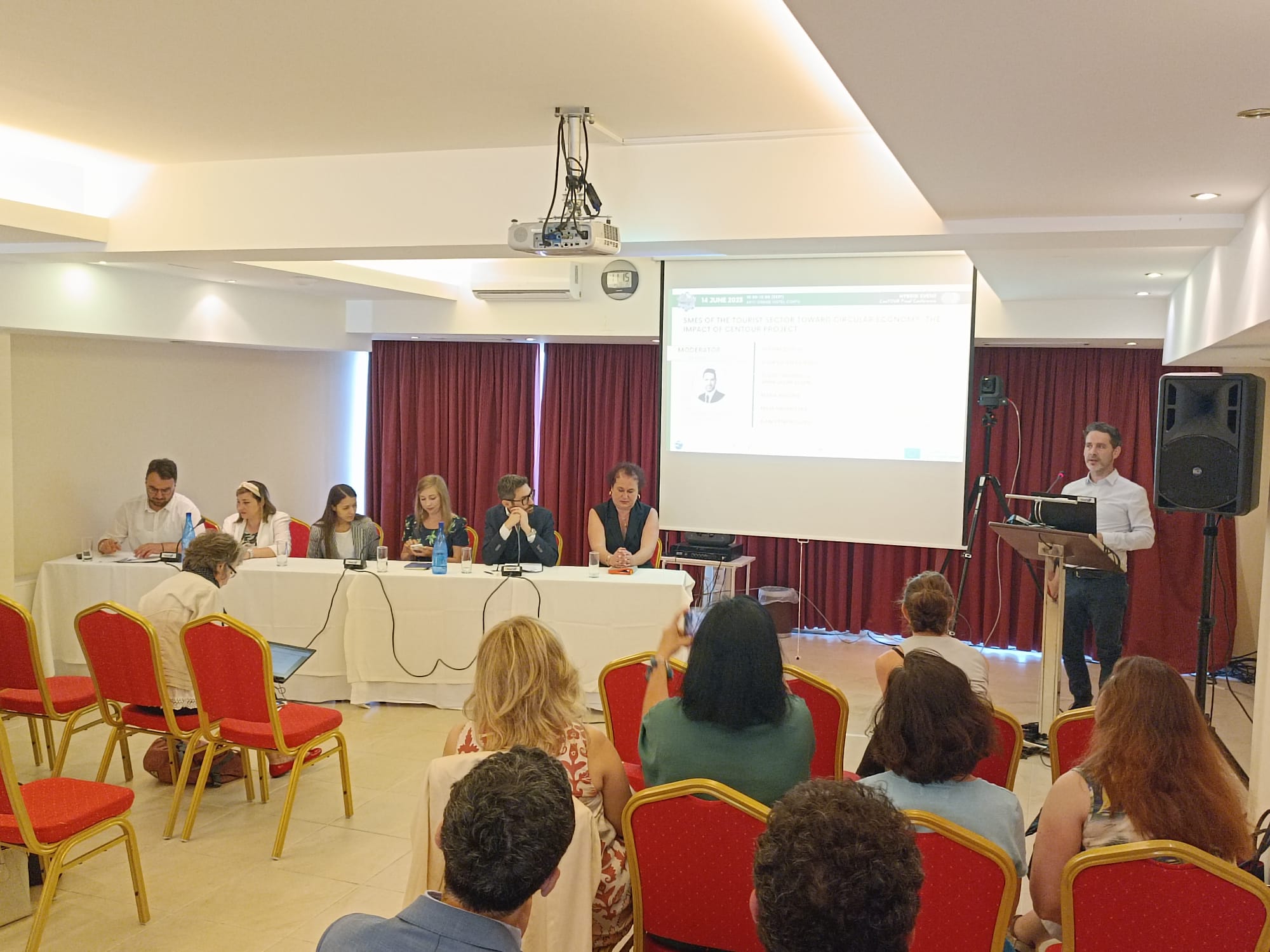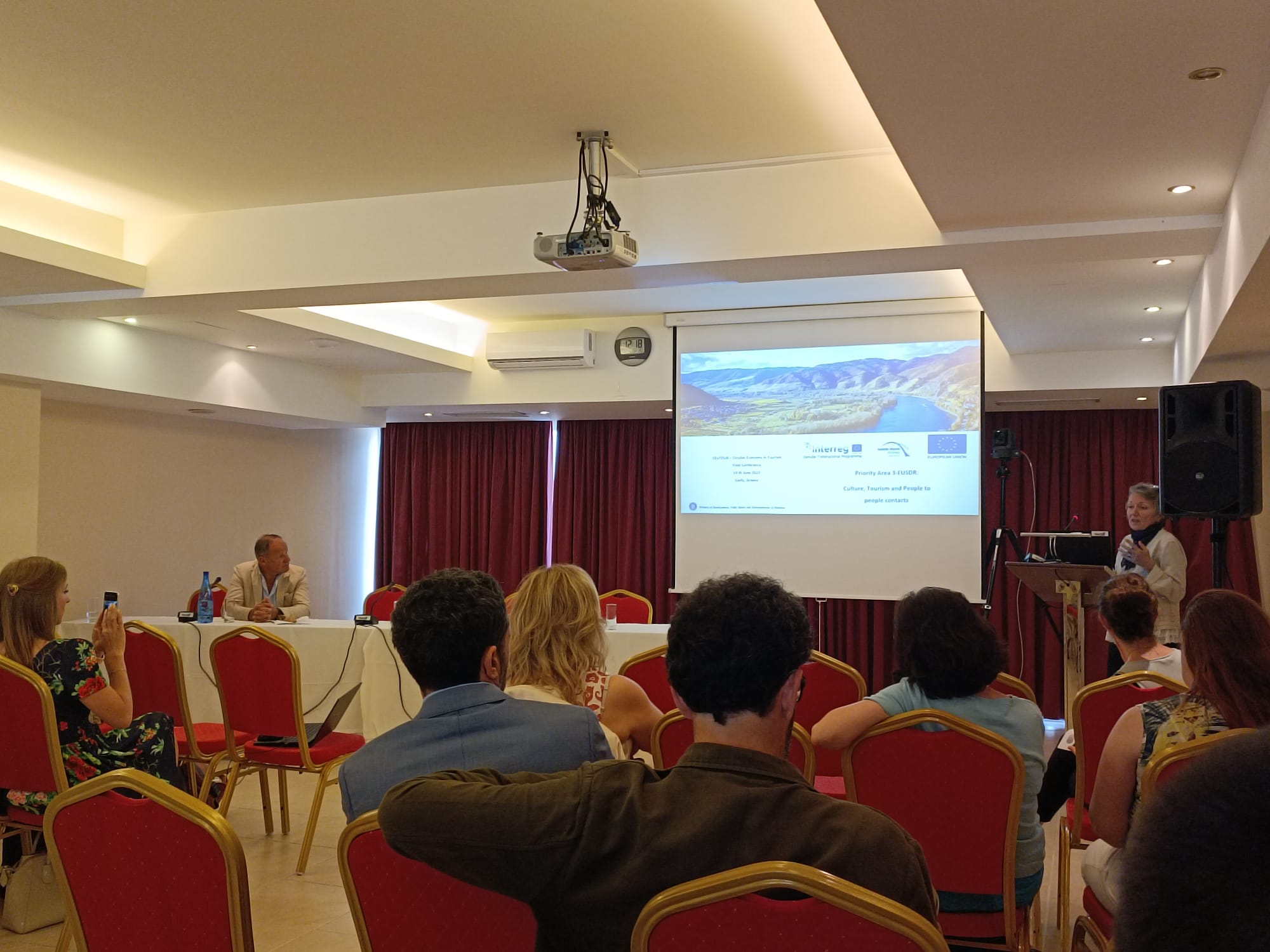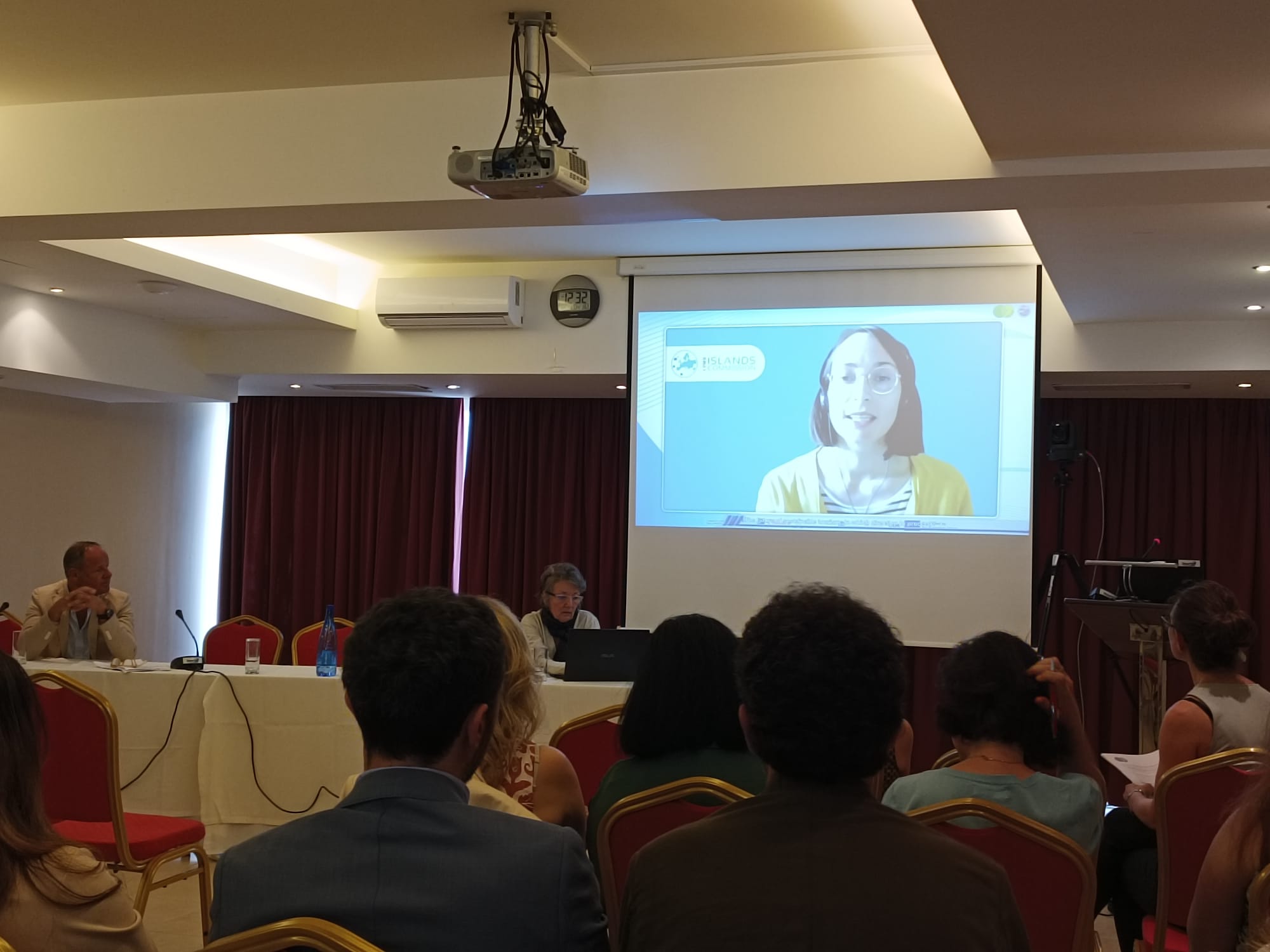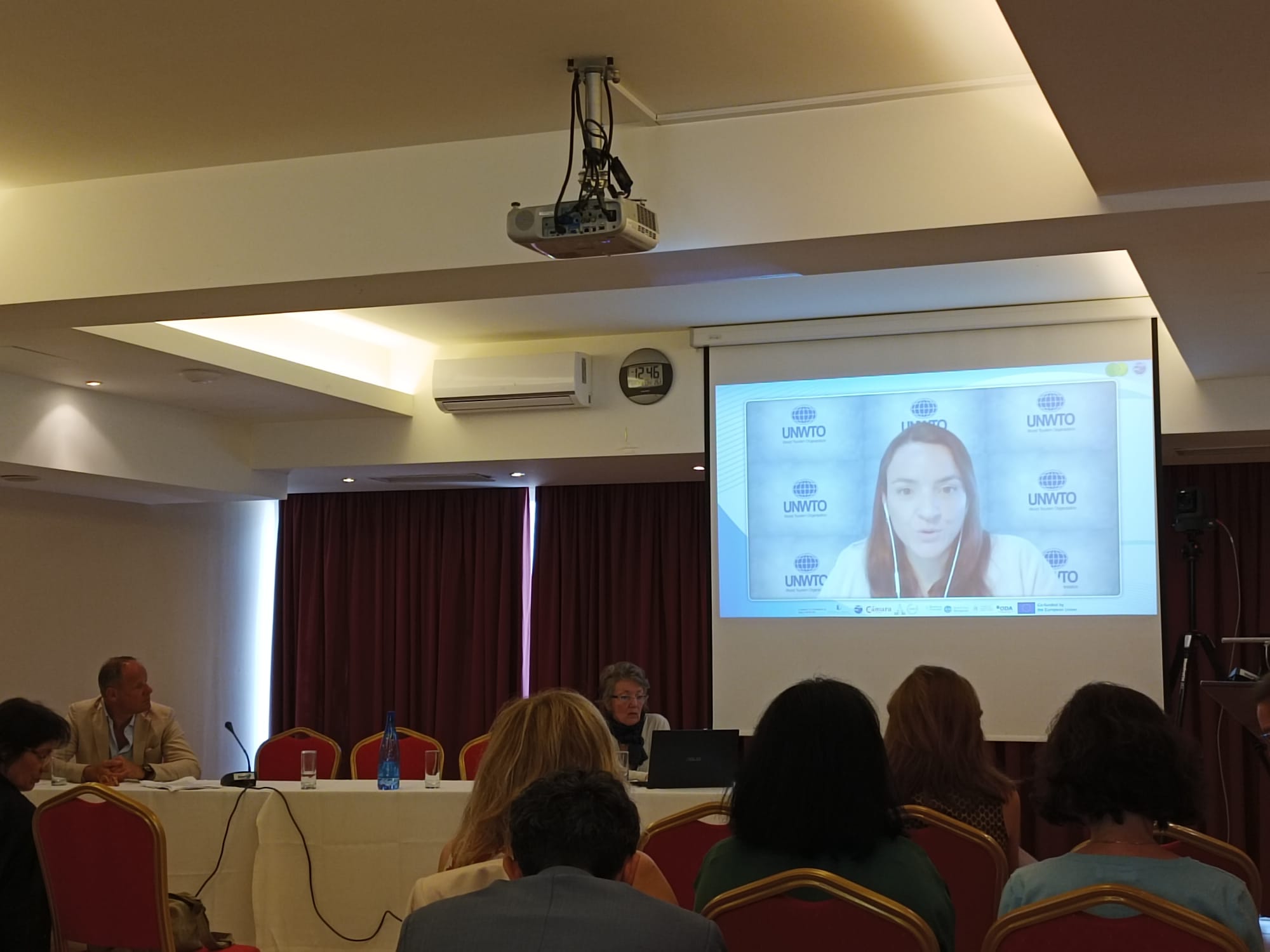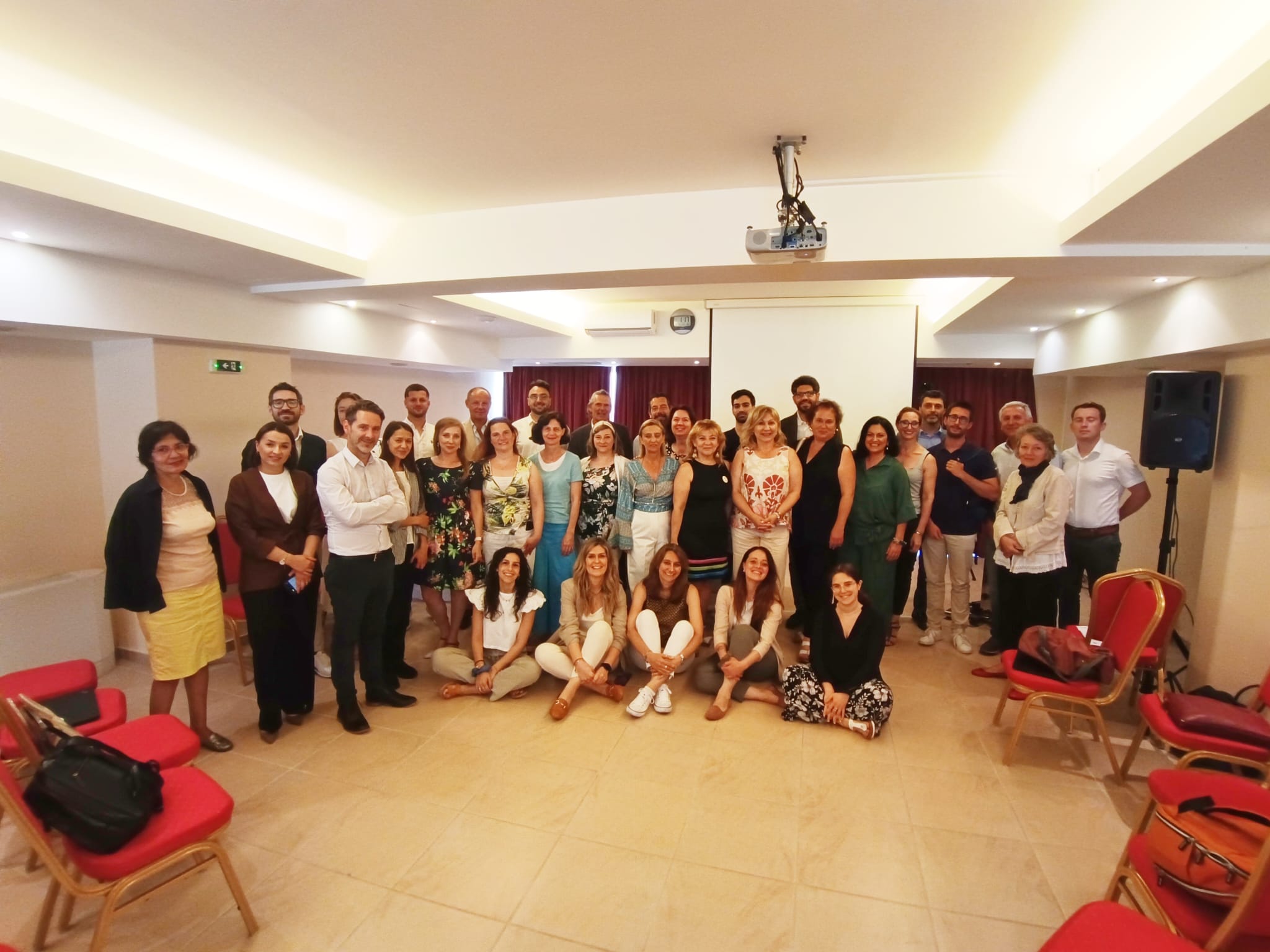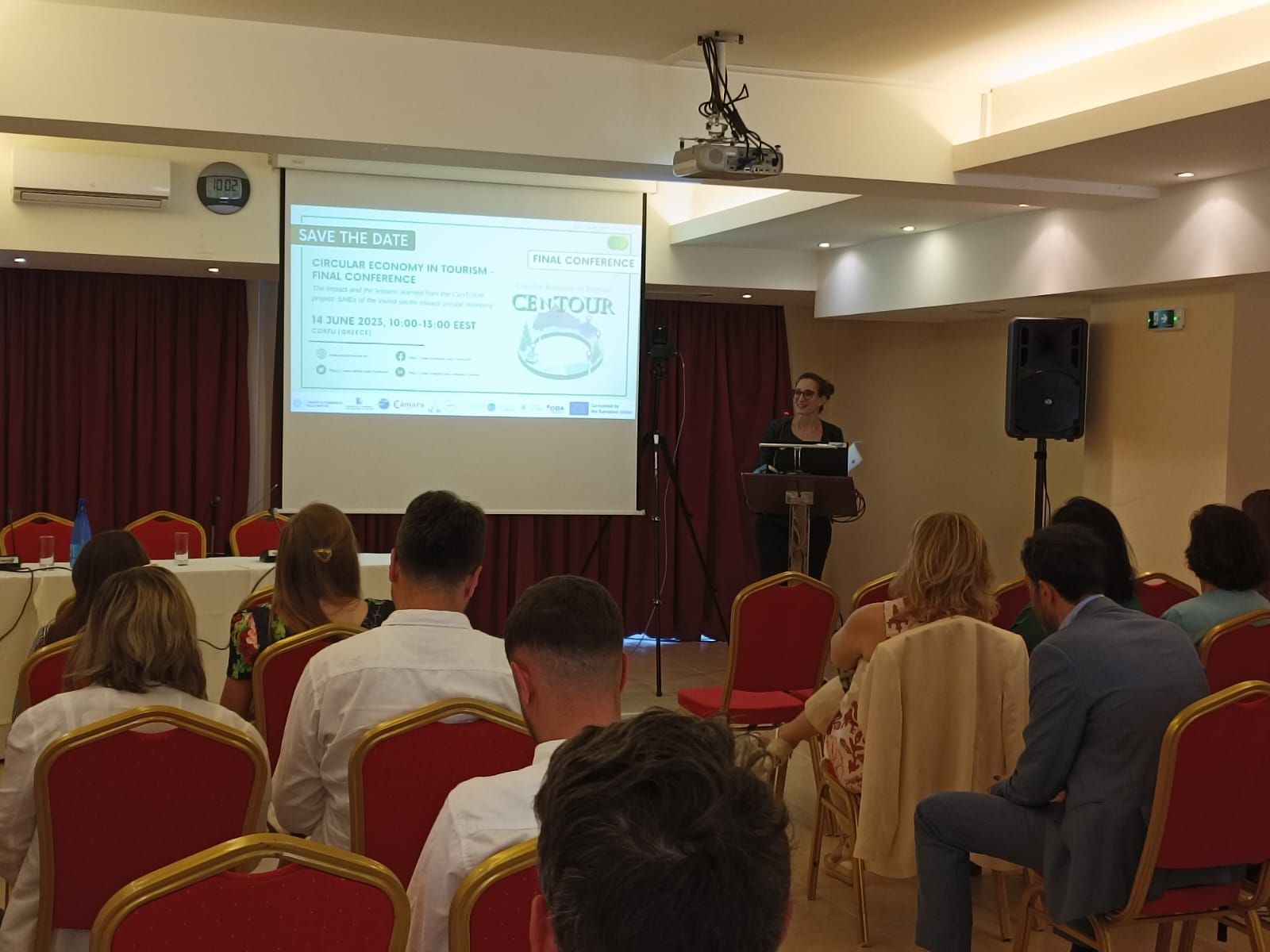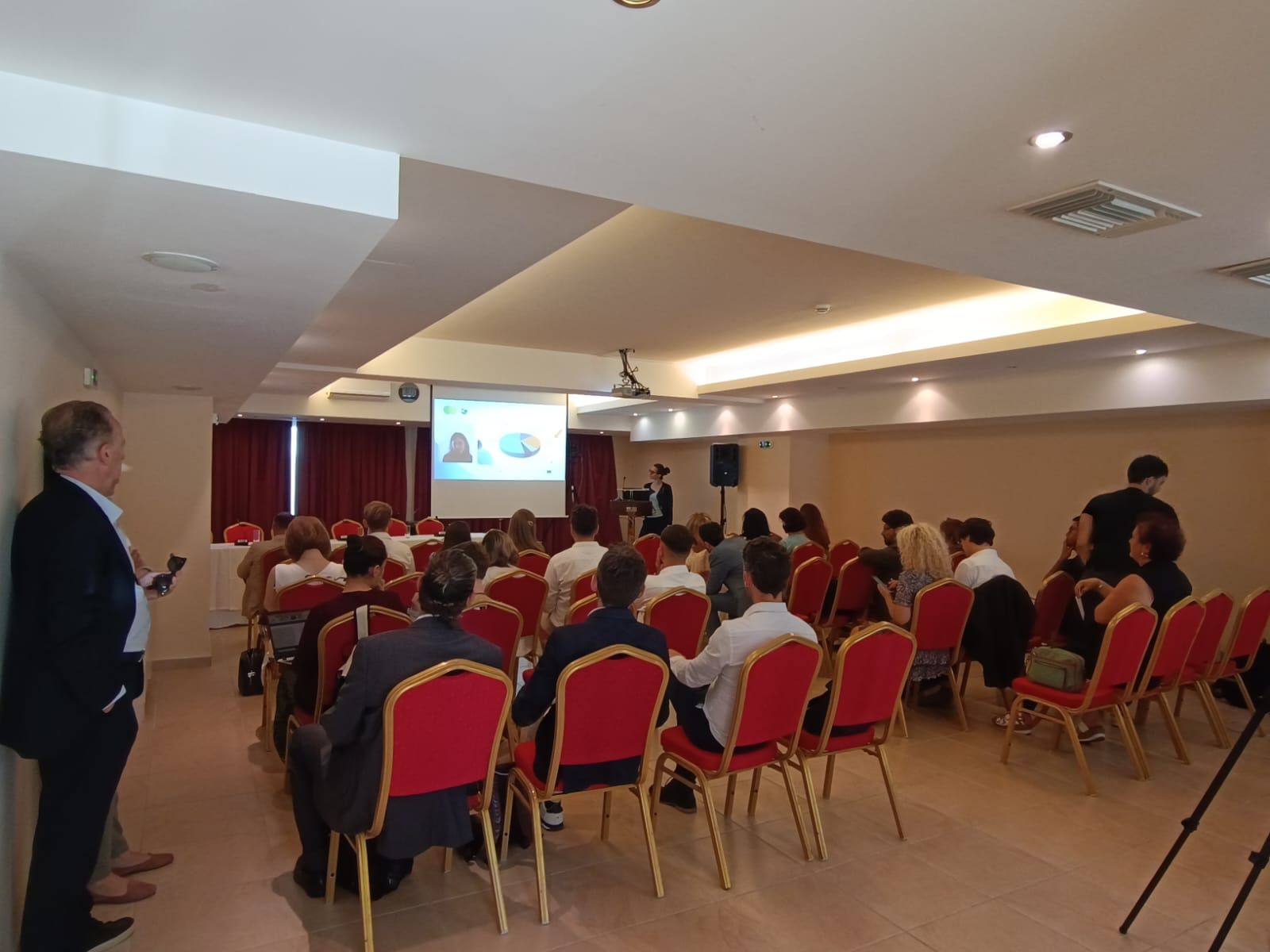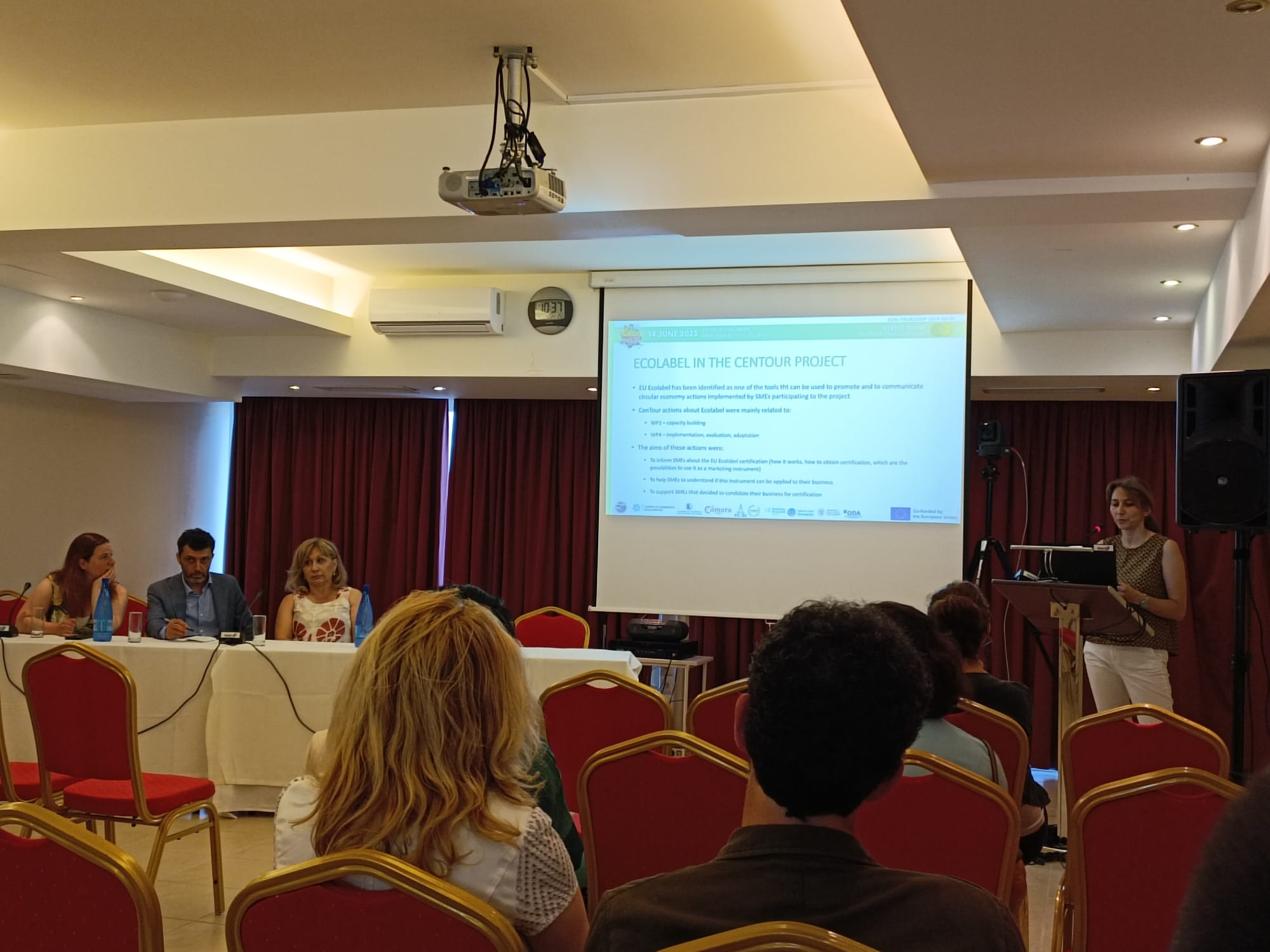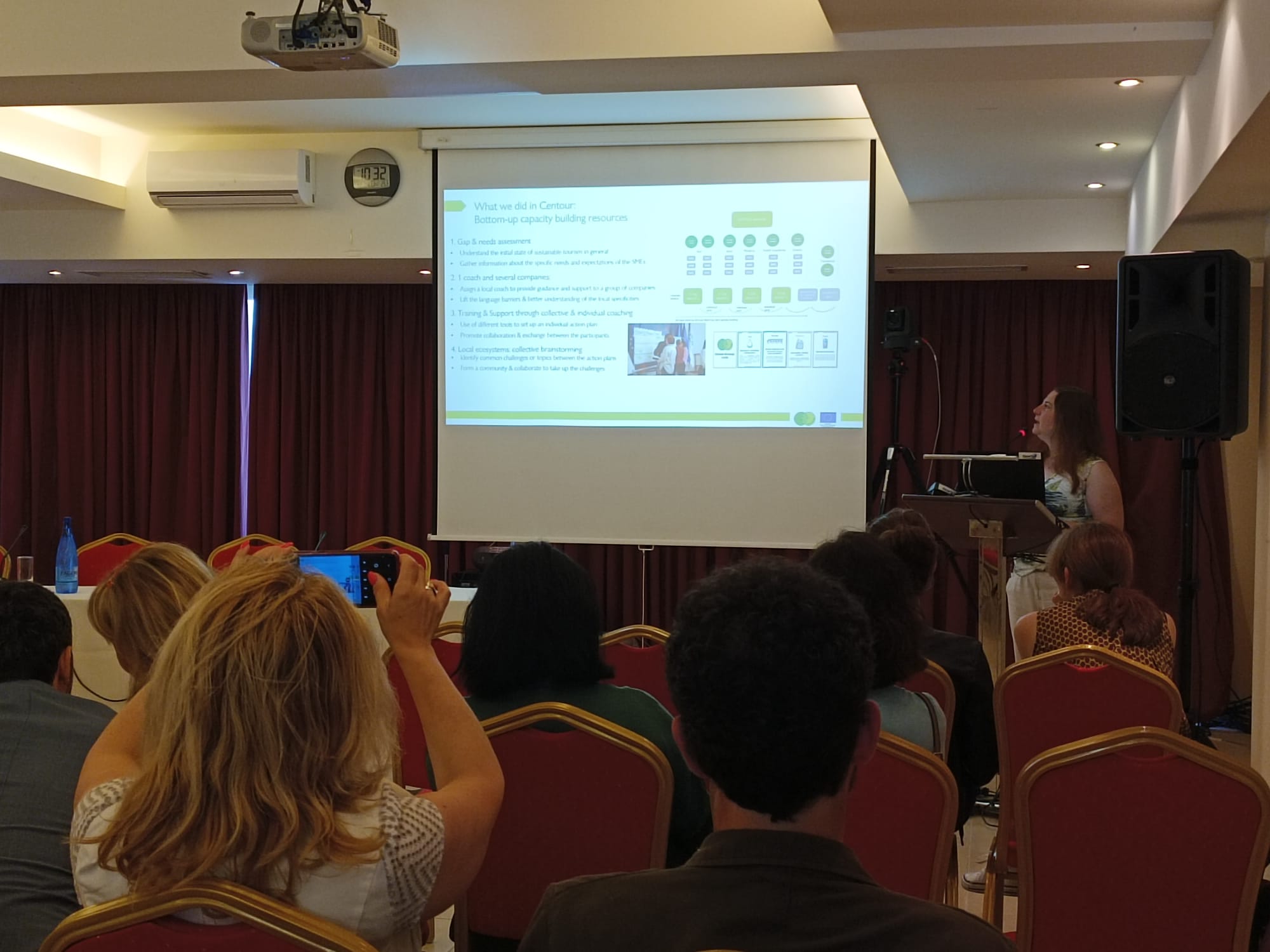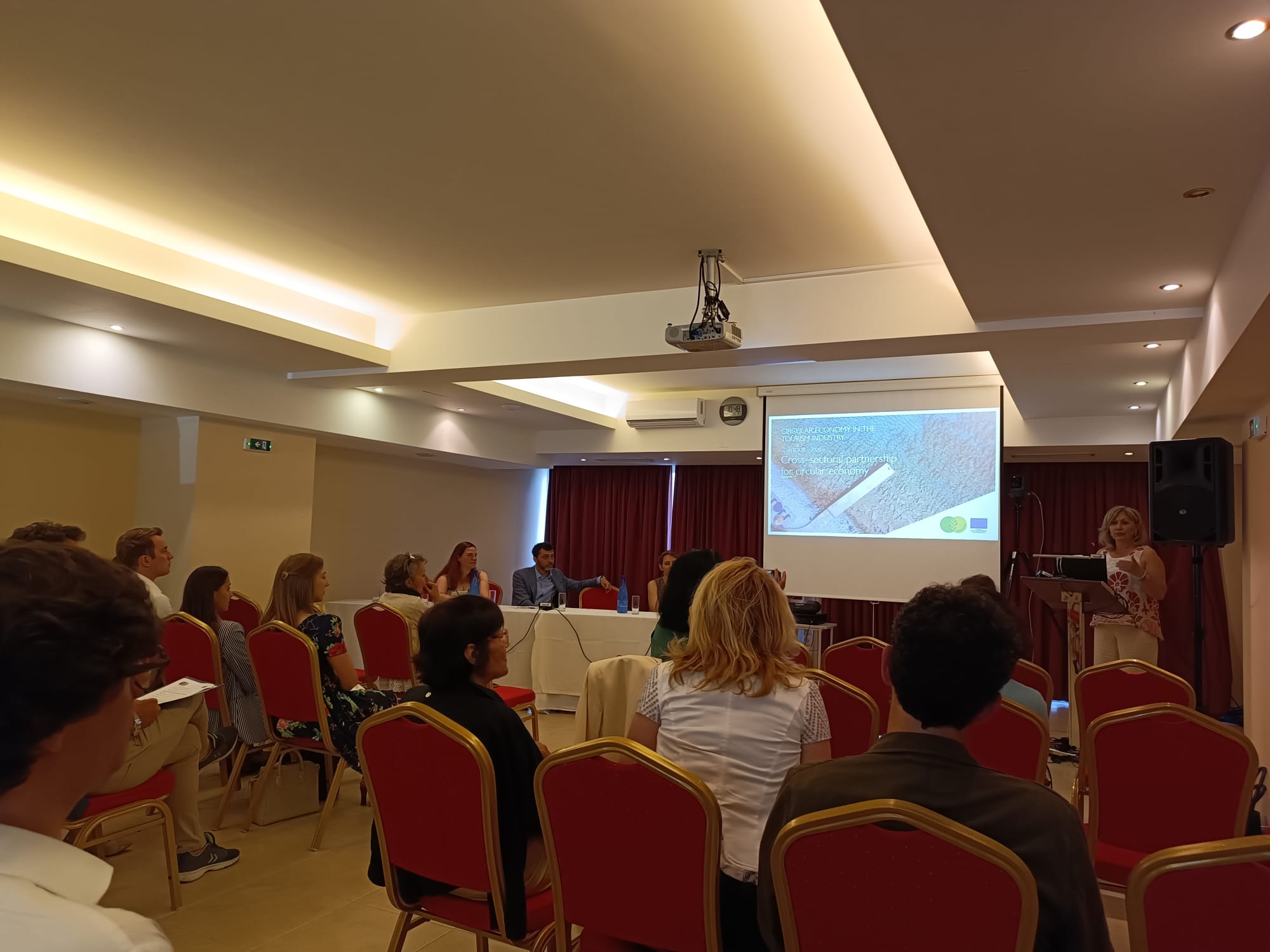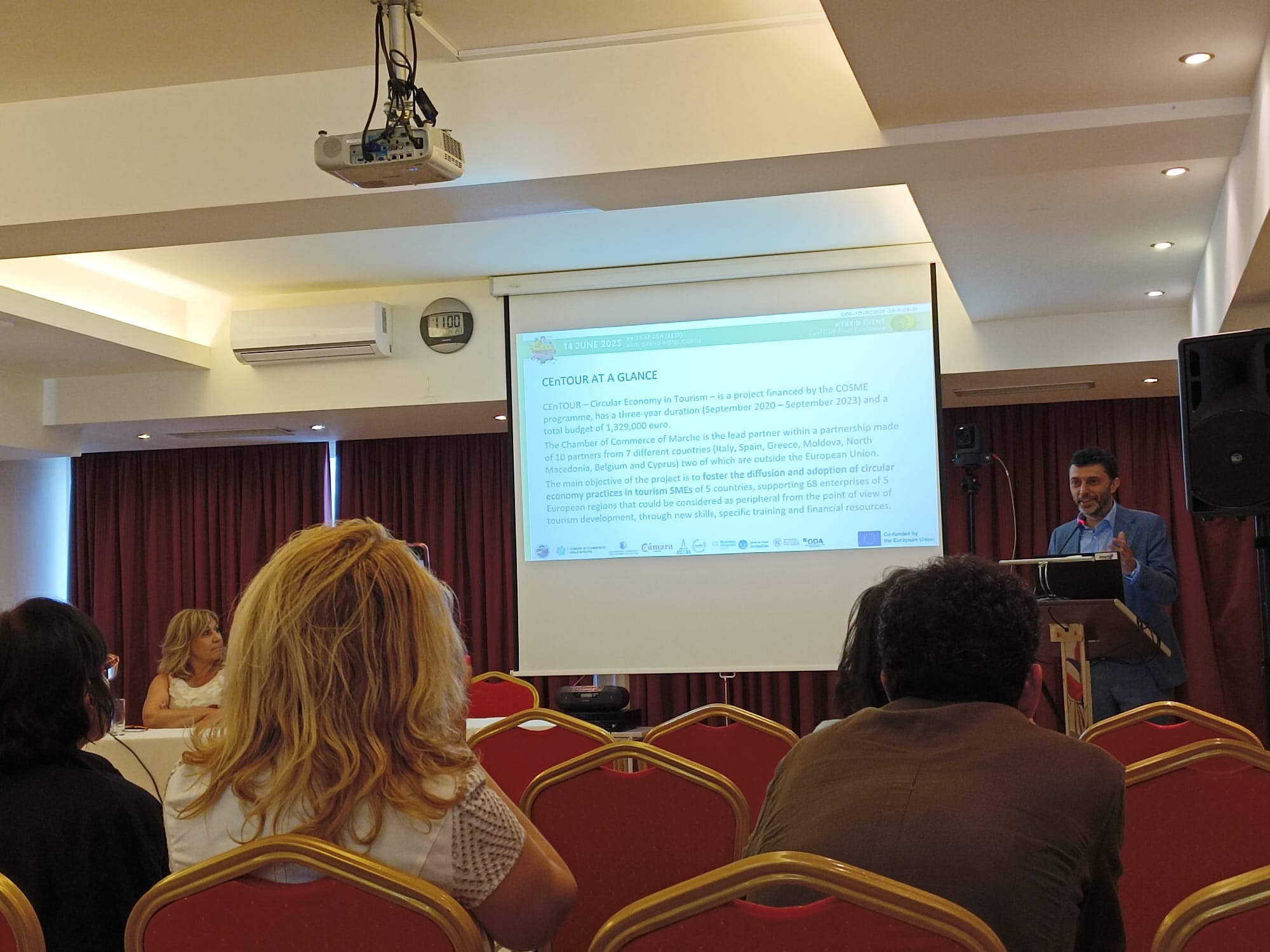It is a crucial phase for the Tourism Industry, with the possibility to recover from the pandemic emergency and a renewed attention to sustainable shared practices based on needs for authenticity.
We live in a moment of great development and innovation, but with no simple way to circularity. It is fundamental to create and disseminate the capacity to think and act collectively, to experiment sharing objectives, especially for SMEs.
The journey of the SMEs participating in CEnTOUR is coming to an end. During our Final Conference, which was held on the 14th June in a hybrid mode in Corfu and online, we got to know some of them and discussed together the results of the project, also by questioning where the tourism sector is going in terms of sustainability.
Introduced and moderated by Ms. Elena Gentilini, Progetto Arcadia, CEnTOUR Project Partner, the welcome greetings saw the intervention of Ms. Lucia Masarova, Project Adviser at European Innovation Council and Small and Medium-sized Enterprises Executive Agency (EISMEA). Ms. Masarova underlined the importance of green actions in tourism, the very reason why CEnTOUR and other projects from the COSME programme were funded. The programme is specifically meant for small and medium enterprises in order for them to become more competitive. The programme ended in 2020 and is now succeeded by the “Single Market Programme” (SMP) running until 2027, to help the single market reach its full potential and ensure Europe’s recovery from the COVID-19 pandemic. Within the new programme there’s a specific pillar devoted to SMEs, aiming to provide various forms of support to businesses and especially SMEs: Facilitate market access and reduce administrative burden, Support the uptake of innovation and addressing global and societal challenges, Foster a favourable business environment and entrepreneurial culture. The European Innovation Council and SMEs Executive Agency (EISMEA) has been active since 2021 and has a clear focus on innovation and SMEs through 3 programmes: Horizon Europe – the EIC, the SMP, including SME Pillar (+ COSME legacy programme) and the European Regional Development (ERDF). New call for SMEs will be published soon to support Transitioning to a more sustainable and resilient ecosystem – empowering tourism SMEs.
The first session, named “CEnTOUR PROJECT: SKILLS, STRATEGIES and ADOPTION OF SUSTAINABLE SOLUTIONS. LESSONS LEARNED. WITH THE FOCUS ON WASTE IN THE FOOD SECTOR, PLASTIC MANAGEMENT” saw the participation of representatives of the Project’s partnership:
- Ms. Geneviève Halin, Circular Economy Expert, Ecores, “Building capacity and developing solutions in different tourism systems”
- Ms. Valentina Castellani, Circular Economy Expert, Progetto Arcadia “EU Ecolabel in the five project Countries”
- Ms. Anthi Panagiotou, Project Manager, Xanti Chamber of Commerce, “Cross–sectoral partnership for circular economy”
- Mr. Andrea Mosconi, Project Officer at Marche Chamber of Commerce – CEnTOUR project Lead Partner “Main challenges, achievements and opportunities”
Ms. Halin gave a presentation about the activity of Capacity building that has been implemented within the project. Circular Economy implies having a different mindset and shifting from a linear system (take, make, dispose) to a circular system where the resources are used efficiently. It is important to move from “ownership” to “accessibility”, sharing, collaborating, renting and so on, prioritising products with a longer life span, that can be repaired and reused. The most important goals of the Circular Capacity Building journey of the SMEs involved in the project were: get inspired, learn to recognise the right resources, get well equipped with tools and methodologies, connect and exchange with other actors of the sector. In order to reach those goals different strategies and activities were put in place: a study visit to Amsterdam, to see what one of the most environmentally sustainable cities in the world is doing in terms of green hospitality, a database of best practices has been created for SMEs to get inspired, Webinars and Conferences have been organised to share insights and success stories in circularity. Moreover a free online platform has been created with learning modules, and a community of practice accessible via a Forum section on the website, as a place of encounter for the SMEs. An essential role has been played by the Facilitators, who have been trained and had the capacity of guiding the SMEs on a local level, in order to eliminate any language barrier and to better understand the local challenges that each SMEs is facing.
Ms. Castellani then focused on the EU Ecolabel, which has been identified as one of the tools that can be used to promote and to communicate circular economy actions implemented by the SMEs participating in the project. The goal of the project was to inform them about the possibility to obtain an EU Ecolabel certification (how it works, how to obtain a certification, which are the possibilities to use it as a marketing instrument); the facilitators helped the SMEs understand if this instrument could be applied to their business and then supported the SMEs that decided to candidate their business for certification. Around 30 SMEs manifested interest for the EU Ecolabel and therefore participated in a feasibility assessment phase (SMEs from North Macedonia, Moldova, and Italy); half of them were already able to satisfy mandatory criteria and are currently considering the possibility to apply for certification, 3 SMEs from Italy are currently working at the preparation of the application dossier.
Ms. Panagiotou gave the participants a background on Cross–sectoral partnerships for circular economy, involving collaboration between different sectors. Cross-sectoral partnerships are essential for accelerating the transition to a circular economy. By bringing together stakeholders from different sectors, we can identify opportunities for resource efficiency, waste reduction, and innovation, and work together to overcome the systemic barriers that prevent us from achieving a circular economy. There are of course several systemic barriers that prevent the transition to a circular economy: linear business models, lack of incentives, limited infrastructure, consumer behaviour, regulatory barriers. An important step that can help in developing cross-sectoral partnerships for a circular economy is the definition of the goals of the partnership, that should be specific, measurable, achievable, relevant, and time-bound (SMART). This should be a collaborative process that involves all stakeholders and ensures that everyone is aligned on the vision and objectives of the partnership.
Mr. Mosconi wrapped up the opening session by summarising the projects after 3 years of implementation. The main objective of the project was to foster the diffusion and adoption of circular economy practices in tourism SMEs of 5 countries, supporting 68 enterprises from regions that could be considered as peripheral from the point of view of tourism development, through new skills, specific training and financial resources. Of course the challenges have been many; to mention a few: the engagement of such peripheral areas that represented a huge obstacle, but at the same an opportunity, in fact the 5 regions (Marche, Cantabria, Xanthi, Tetovo and Orhei) have been chosen specifically for their current low touristic attractiveness; the high seasonality of the sector made difficult to manage a regular flow of the activities, especially from May to October. The achievements of the project were also many: Italian and Greek SMEs decided to use the financial support to think in a different way about their energy consumption approach; the water consumption reduction has been a second major objective.
Moldovan and North Macedonian companies have adopted action plans where the food waste and energy consumption reduction were the main reasons to use the financial support given by EISMEA, but he strategy chosen by the SMEs (supported by the CEFs) was often made of a blend of different aspects: energy or water saving, less plastic or food waste, a new communicative approach, new marketing drivers. It is clear that the CEnTOUR project might be considered by each member of the partnership and the beneficiaries entities as a starting point for a bigger engagement in terms of circular economy or sustainability oriented activities.
___
The second session was a Panel discussion named “SMES OF THE TOURIST SECTOR TOWARD CIRCULAR ECONOMY: THE IMPACT OF CEnTOUR PROJECT. ENTERPRISES AND FACILITATORS SHARE THEIR EXPERIENCE”.
Introduced and moderated by Mr. Erwan Mouazan, Circular Economy Expert at Ecores, CEnTOUR project Partner, it saw the interventions of:
- Ms. Tatiana Chiriac, Green Economy Expert, ODA, CEnTOUR Facilitator (Republic of Moldova)
- Mr. Gjorgji Rafajlovski, Circular Economy Expert, Business and Innovation Center, CEnTOUR Facilitator (North Macedonia)
- Mr. Silvio Cardinali and Ms. Anna Laura Eusebi, Marche Polytechnic University (Italy) (online)
- Ms. Maria Benzing, Casa din Lunca, SME participating in CEnTOUR (Republic of Moldova)
- Ms. Maja Naumceska, Hotel Tai Group DOO Mavrovo, SME participating in CEnTOUR (North Macedonia)
- Ms. Eleni Petropoulou, Kokkymelon Hotel, SME participating in CEnTOUR (Greece)
Ms. Chiriac underlined the difficulties encountered by the Moldovan team, due to the pandemic period that made the engagement of the SMEs very difficult. They were nevertheless very interested in the project and wanted to be involved in the process to obtain the Ecolabel certification. During the Capacity Building sessions, it turned out that “Collaborative consumption” is the theme that interested the SMEs the most, followed by “local networking opportunities” , “Energy and water use”, “food waste” and “renewable energy”. In terms of financial support, the majority of it, almost 50%, has been devoted to communication activities, since the SMEs understood that even if there are valuable and efficient strategies in place, results will not be seen if there is a lack in the communication to the clients; the rest of the financial support has been invested in activities related to the creation of partnerships with strategic stakeholders, reduction of food waste and reduction of the use of plastic.
Ms. Eusebi presented the experience of Italian facilitators, who had to manage the capacity building of many different realities with very different needs. All the SMEs enrolled in the project participated in all the working and learning sessions, showing a great interest towards a more circular approach in the sector. After the first coaching sessions, several strategies were addressed to evaluate the best solutions for the SMEs to find more sustainable technologies especially in Energy/Plastic/Water consumption.
Mr. Rafajlovski affirmed that also for the North Macedonian SMEs the most important subjects to tackle were food, water and energy consumption, but they were consistently engaged through all the phases of the project. Essential was the topic of communication: being able to clearly communicate the actions that are in place to the clients. Sometimes SEMs are already successfully implementing circular strategies without even being aware of it, so one of the most important achievements of this project has actually been the creation of a greater awareness on the subject of circular economy in tourism.
Ms. Naumceska, representative of one of the SMEs beneficiaries of the project in North Macedonia, confirmed that being aware of the activities implemented within a business is not to be taken for granted and it is important to be able to recognise the right strategies and then actively and efficiently communicate them to the clients.
Ms. Benzing, representative of one of the SMEs beneficiaries of the project in Moldova, affirmed that a change towards a more sustainable economy is necessary especially for places that are rich in history and cultural/natural heritage. Their main concern was specifically how to switch to renewable energy; CEnTOUR project gave them the support needed to do an assessment and find the right solution. Moreover they signed partnership agreements with stakeholders specialised in the sorting of waste, in order to reduce the impact of their structure.
Ms. Petropoulou, representative of one of the SMEs beneficiaries of the project in Greece, presented her experience within the project, that helped her strengthen the impact of some of the activities already implemented in her business, such as the collection of rainwater for gardening use; but surely the most important take home is the networking experience, the opportunity to get to know people and professionals that care about sustainability and that are willing to act together to share new challenges and reach a common goal.
Mr. Cardinali underlined the need to cooperate among capable partners and stakeholders. Since the very beginning of the project, the focus has been the creation of a strong partnership with the right professional profiles. Companies know they have to be more sustainable, they just need some help and support in understanding how to do it; that’s the scenario CEnTOUR inserted itself in.
—
The third session named “THE FUTURE OF SUSTAINABLE TOURISM: IN WHICH DIRECTION TO PROCEED?” was moderated by Ms. Elena Gentilini, Progetto Arcadia, CEnTOUR Project Partner, and saw the participation of:
- Ms. Virginia Fernandez-Trapa, Coordinator One Planet network UNWTO, “Advancing circularity in the tourism sector through commitment” (online)
- Ms. Irina Cozma, on behalf of Priority Area 3 “Culture, tourism and people to people contacts” – EU Strategy for the Danube Region (EUSDR) coordination team, Directorate General of Regional Development and Infrastructure, Ministry of Development, Public Works and Administration (Romania)
- Mr. Joze Tomaš, President of the Forum of the Adriatic and Ionian Chambers of Commerce (Forum AIC) – European Tourism Going Green Project (ETGG2030)
- Ms. Lise Guennal, Senior Project and Policy Officer at Islands Commission of the Conference of Peripheral Maritime Regions (CPMR) (online)
Ms. Cozma introduced the Priority Area 3 of EUSDR, which facilitates the implementation of activities aiming at collaboration and cooperation within the region. Tourism development and the promotion of cultural heritage are also main objectives of the PA3. As mentioned by many of the speakers, the challenges in the sector are many: the effects of Covid-19, economic imbalances, negative impact of touristic activities on the environment and so on; only through collaboration is it possible to fight all those difficulties and find a common solution.
Mr. Tomaš presented the European Tourism Going Green Project (ETGG2030), under the COSME programme, that ended in Vienna during this year and it was a great success involving 7 countries. 11 companies from the tourism sector in Croatia were certified with eco labels, a very important recognition to boost competitiveness. He then presented the Forum of Adriatic and Ionian Chambers of Commerce, which provides a practical contribution to European integration through the development of the entrepreneurial spirit and support to small and medium enterprises, in favour of development and employment. During its 20, years of activity, through its high level events, congresses and activities, the Forum has committed itself to support businesses and foster the debate on topics such as Sustainable Tourism, Circular Economy, Creative and Cultural Industries and Energy Efficiency through the use of renewable energy sources; all while placing the new generations at the centre of the action. It is necessary to discuss the important matter of sustainability in tourism; the awareness rises from these kinds of meetings and roundtable discussions and with consistency it will ensure a more sustainable future for tourism, mainly composed of three entities: tourists, locals and businesses and all of them need to benefit from the sector, all while preserving the ecosystem.
Ms. Guennal underlined the crucial role that tourism plays in the economies of islands and not only, but at the same time our responsibility to preserve the natural and cultural heritage of touristic areas. Environmental protection is to be prioritised, along with strict regulations. Innovation and technology can help us overcome barriers and can be very powerful to educate travellers and to promote sharing of best practices. Collaboration and the creation of partnerships are change drivers: governments, local and national authorities, tourism boards, private sector entities, non governmental organisations should join forces to envision a more sustainable future for tourism.
Ms. Fernandez-Trapa introduced the “One Planet Sustainable Tourism Programme” developed by UNWTO, a participatory platform, aiming at accelerating sustainable consumption and production to address the challenges of climate change, biodiversity loss and pollution. The activities are structured around 3 main pillars: Glasgow Declaration on Climate Action in Tourism, Global Tourism Plastics Initiative, Global Roadmap on Food Waste Reduction. The crisis hit the tourist sector harder than any other sectors, but in a way it gave us the opportunity to rethink our actions, and become more aware of the fact that sustainability also means resilience, representing a competitive trait and ensuring the preservation of the sector. UNWTO proposed a series of commitments to its stakeholders, in order to provide them with clear guidance on the future actions to be implemented. One of the Commitments is the Glasgow Declaration, supporting the global goals to halve emissions by 2030 and reach Net Zero by 2050 at the latest (Paris Agreement); a second one is the Global Tourism Plastics Initiative, aiming at eliminate problematic or unnecessary plastic items and packaging, integrate reuse models or reusable alternatives and collaborate to increase recycled content and recycling and composting rates. Finally, as part of the “One Planet Sustainable Tourism Programme”, the UNWTO implemented the Global Roadmap for Food Waste Reduction in the Tourism Sector, that focuses on the prevention of food waste and surplus, the redistribution of surplus food (to people) and the diversion of food waste from landfill through revalorization processes.
To conclude, Sustainability in tourism represents a big challenge, being a service-based sector composed of many different cross-sectoral activities and including stakeholders of different nature. The main take home is the importance of close relationships between stakeholders, cooperation and collaboration are the only ways of achieving great results in terms of resilience and sustainability.
